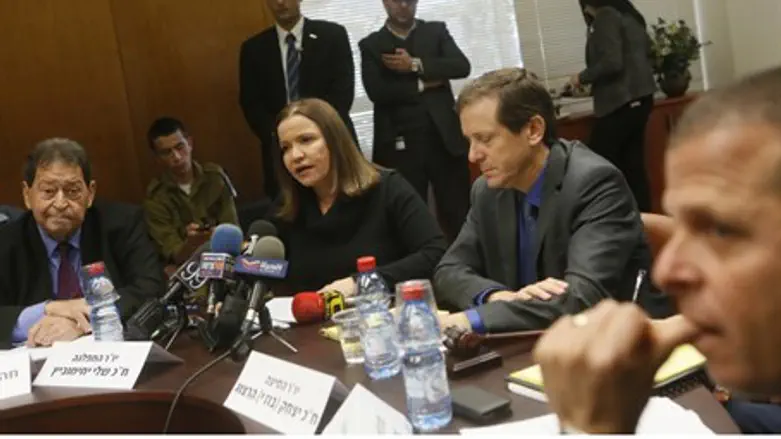
The Geneva Initiative continues to work to convince MKs of its plan for peace between Israel and the Palestinian Authority. Its latest seminar, which recently concluded, included MKs from Yesh Atid and Labor, who met with former senior PA officials such as former minister Qadura Fares, former PA parliament member Abdullah Abdullah, and former senior aide to Salam Fayyad, Jamal Zahut.
Arutz Sheva spoke to one of the participants, MK Moshe Mizrachi of the Labor party.
Mizrachi spoke about the possibility, mentioned by Justice Minister Tzipi Livni, that his party’s Knesset faction will replace the Bayit Yehudi (Jewish Home) faction if Bayit Yehudi quits the government over Israeli concessions to the PA.
That scenario is a long way off, he said. Bayit Yehudi is likely to stay in government thanks to the Referendum Law, he explained, “Bennett and his people are calming down their voters, saying, ‘there’s no reason to leave the government, because in the end the whole process depends on a national referendum.’”
In the meantime, he said, “We’ll support [the talks] with all of our might from outside the coalition. We’ll be there at every junction, giving support.”
However, he said, if Bayit Yehudi does decide to leave, “then we’ll be there, like the head of our party said. If we need to enter government because of some dramatic process, where the Bayit Yehudi party left and the government needs support, we’ll be there.”
The lack of a peace agreement to date is the fault of both Israeli and PA leaders, he argued. When asked about PA Chairman Mahmoud Abbas’ failure to respond to then-Prime Minister Ehud Olmert’s 2008 peace offer – which reportedly included 94% of the land the PA demanded and a PA Arab capital in Jerusalem - Mizrachi explained that Abbas had been warned not to rely on Olmert’s proposals due to Olmert’s legal woes.
At the time, Abbas was facing woes of his own, as well: Hamas had seized control of Gaza, leaving him effectively the leader of just over half of the PA Arab population. Less than one year later Abbas’ term as PA Chairman expired, but he remains in power due to his insistence that new elections be held only after Fatah and Hamas come to an agreement.
Mizrachi agreed that former PA Chairman Yasser Arafat was wrong in not accepting Ehud Barak’s earlier peace offer, but argued that there was fault on both sides. “There was a lack of decisive leadership… If you’re asking me where exactly [to place blame], I’d say it rests with both parties… We also get cold feet when it comes to the final stage,” he said.
Mizrachi believes that PA Arabs have come to understand that some demands, such as the “right of return” for millions of descendants of Arabs who fled pre-state Israel, will not be met - although he admitted that Abbas' stance on the demands "depends on which paper he's talking to."
Those at the Geneva Initiative conference understood that an alternative solution will be found, he said.
A solution can be found regarding Jerusalem as well, said Mizrachi. He suggested that leaders on both sides will ultimately accept a plan under which Arab neighborhoods form the capital of an Arab state, while Jewish neighborhoods remain Israeli. Municipal rule could be shared, even as national rule is split, he proposed.